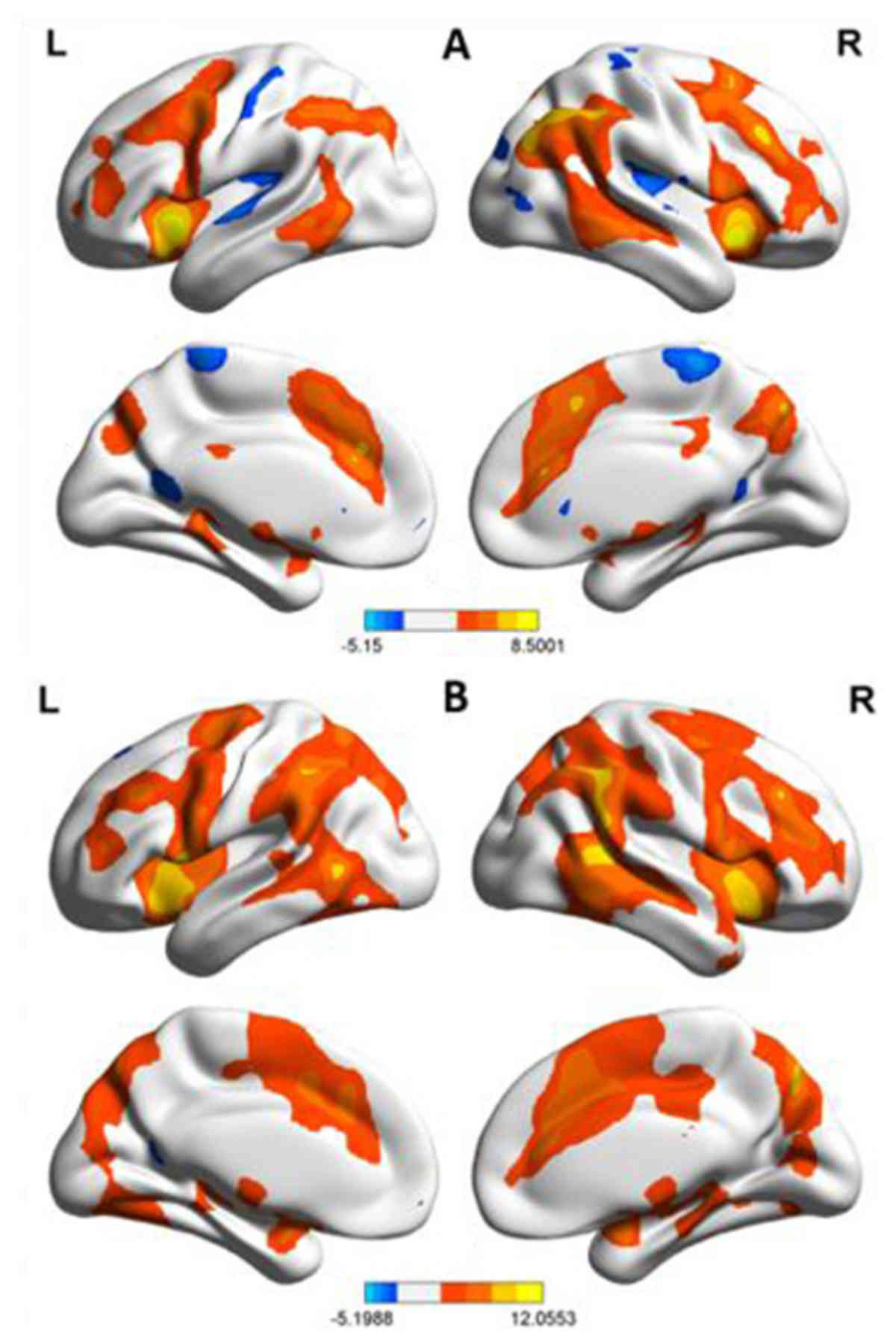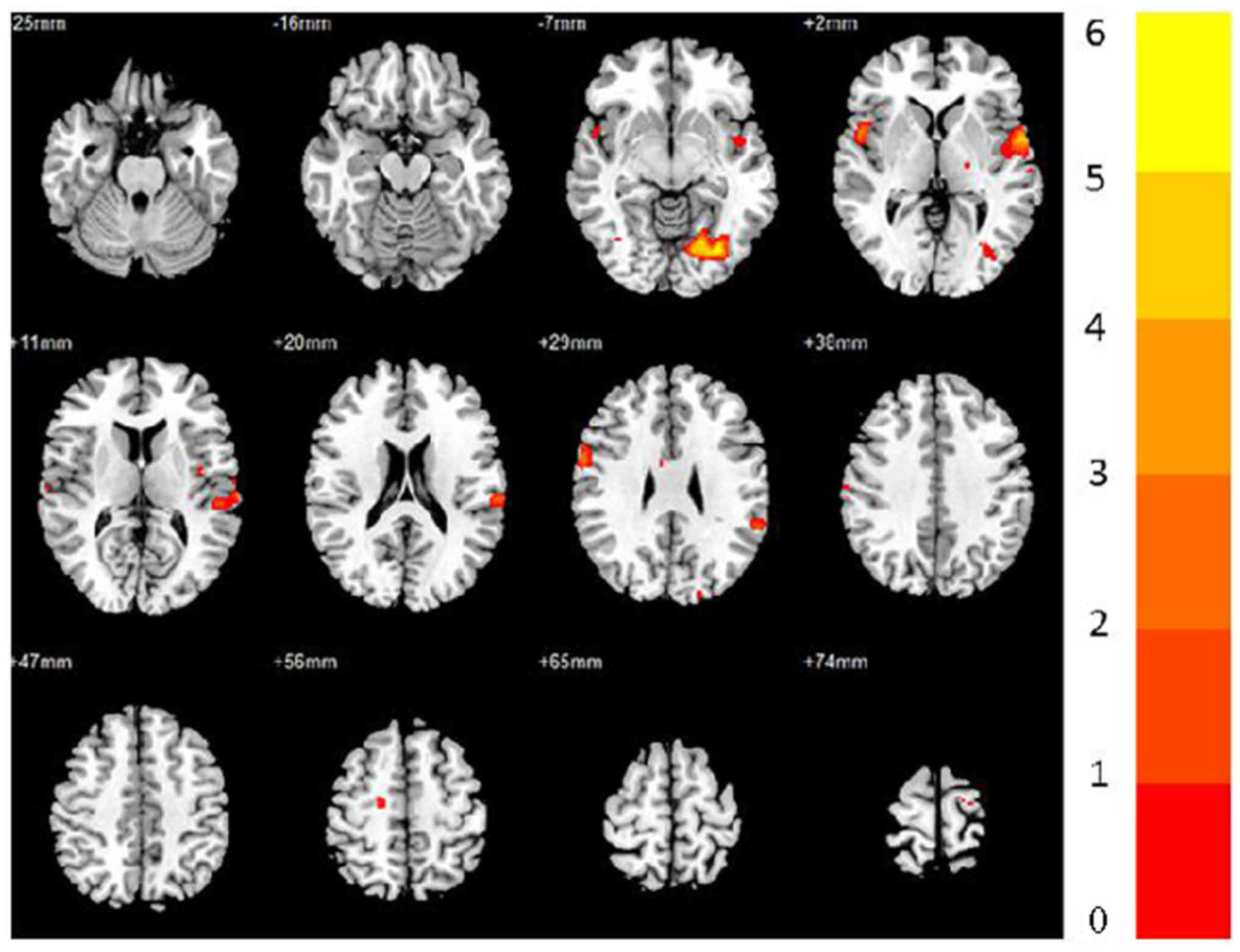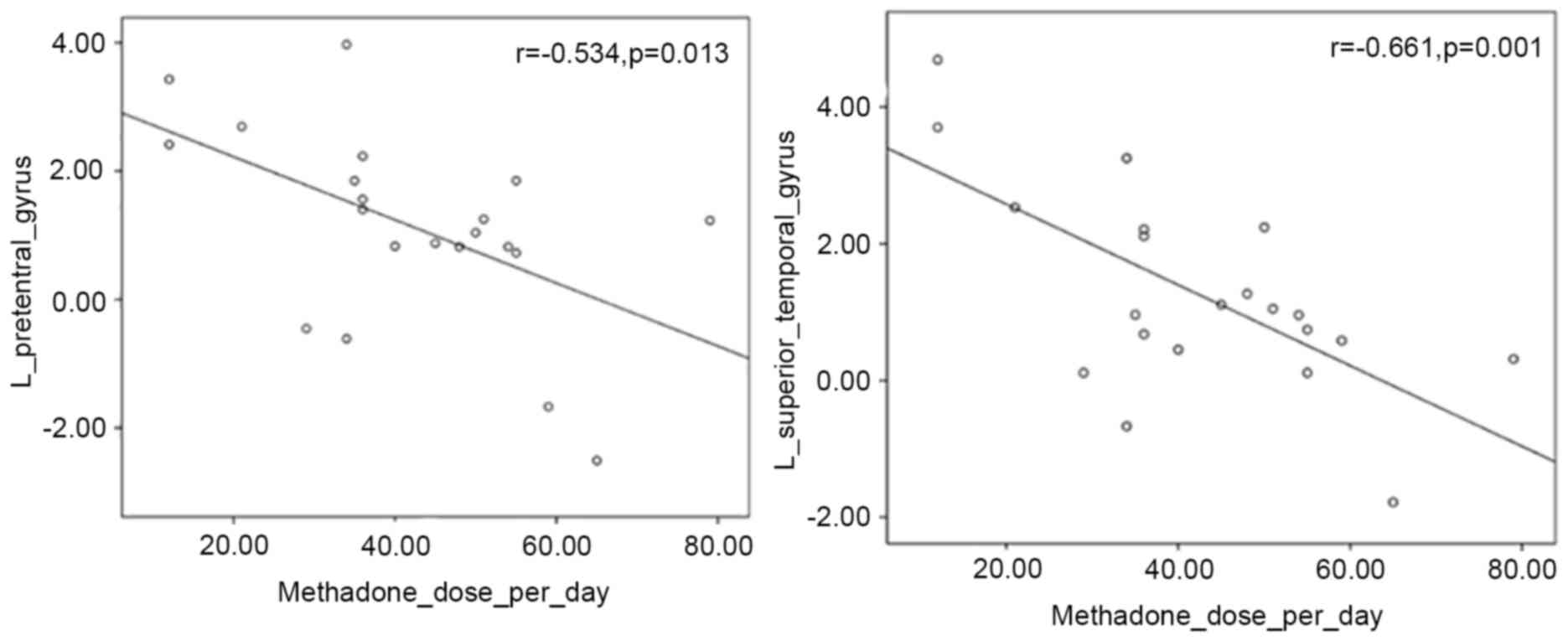|
1
|
Bracken BK, Trksak GH, Penetar DM,
Tartarini WL, Maywalt MA, Dorsey CM and Lukas SE: Response
inhibition and psychomotor speed during methadone maintenance:
Impact of treatment duration, dose, and sleep deprivation. Drug
Alcohol Depend. 125:132–139. 2012. View Article : Google Scholar : PubMed/NCBI
|
|
2
|
Mintzer MZ, Copersino ML and Stitzer ML:
Opioid abuse and cognitive performance. Drug Alcohol Depend.
78:225–230. 2005. View Article : Google Scholar : PubMed/NCBI
|
|
3
|
Constantinou N, Morgan CJ, Battistella S,
O'Ryan D, Davis P and Curran HV: Attentional bias, inhibitory
control and acute stress in current and former opiate addicts. Drug
Alcohol Depend. 109:220–225. 2010. View Article : Google Scholar : PubMed/NCBI
|
|
4
|
Verdejo A, Toribio I, Orozco C, Puente KL
and Pérez-García M: Neuropsychological functioning in methadone
maintenance patients versus abstinent heroin abusers. Drug Alcohol
Depend. 78:283–288. 2005. View Article : Google Scholar : PubMed/NCBI
|
|
5
|
Andersen JM, Olaussen CF, Ripel A and
Mørland J: Long-term methadone treatment impairs novelty preference
in rats both when present and absent in brain tissue. Pharmacol
Biochem Behavior. 98:412–416. 2011. View Article : Google Scholar
|
|
6
|
Tramullas M, Martínez-Cué C and Hurlé MA:
Chronic methadone treatment and repeated withdrawal impair
cognition and increase the expression of apoptosis-related proteins
in mouse brain. Psychopharmacology (Berl). 193:107–120. 2007.
View Article : Google Scholar : PubMed/NCBI
|
|
7
|
Lin WC, Chou KH, Chen CC, Huang CC, Chen
HL, Lu CH, Li SH, Wang YL, Cheng YF and Lin CP: White matter
abnormalities correlating with memory and depression in heroin
users under methadone maintenance treatment. Plos One.
7:e338092012. View Article : Google Scholar : PubMed/NCBI
|
|
8
|
Liao DL, Huang CY, Hu S, Fang SC, Wu CS,
Chen WT, Lee TS, Chen PC and Li CS: Cognitive control in opioid
dependence and methadone maintenance treatment. PloS One.
9:e945892014. View Article : Google Scholar : PubMed/NCBI
|
|
9
|
Gruber SA, Tzilos GK, Silveri MM, Pollack
M, Renshaw PF, Kaufman MJ and Yurgelun-Todd DA: Methadone
maintenance improves cognitive performance after two months of
treatment. Exp Clin Psychopharmacol. 14:157–164. 2006. View Article : Google Scholar : PubMed/NCBI
|
|
10
|
Nigg JT: On inhibition/disinhibition in
developmental psychopathology: Views from cognitive and personality
psychology and a working inhibition taxonomy. Psychol Bull.
126:220–246. 2000. View Article : Google Scholar : PubMed/NCBI
|
|
11
|
Peles E, Schreiber S, Naumovsky Y and
Adelson M: Depression in methadone maintenance treatment patients:
Rate and risk factors. J Affect Disord. 99:213–220. 2007.
View Article : Google Scholar : PubMed/NCBI
|
|
12
|
Kavanaugh BC: The role of inhibitory
control in the hospitalization of children with severe psychiatric
disorders. Clin Neuropsychol. 30:369–370. 2016. View Article : Google Scholar : PubMed/NCBI
|
|
13
|
Lin WC, Chou KH, Chen HL, Huang CC, Lu CH,
Li SH, Wang YL, Cheng YF, Lin CP and Chen CC: Structural deficits
in the emotion circuit and cerebellum are associated with
depression, anxiety and cognitive dysfunction in methadone
maintenance patients: A voxel-based morphometric study. Psychiatry
Res. 201:89–97. 2012. View Article : Google Scholar : PubMed/NCBI
|
|
14
|
Verdejo-Garcia A, Lawrence AJ and Clark L:
Impulsivity as a vulnerability marker for substance-use disorders:
Review of findings from high-risk research, problem gamblers and
genetic association studies. Neurosci Biobehav Rev. 32:777–810.
2008. View Article : Google Scholar : PubMed/NCBI
|
|
15
|
Camchong J, Stenger A and Fein G:
Resting-state synchrony during early alcohol abstinence can predict
subsequent relapse. Cereb Cortex. 23:2086–2099. 2013. View Article : Google Scholar : PubMed/NCBI
|
|
16
|
Mechelli A, Henson RN, Price CJ and
Friston KJ: Comparing event-related and epoch analysis in blocked
design fMRI. Neuroimage. 18:806–810. 2003. View Article : Google Scholar : PubMed/NCBI
|
|
17
|
Friston KJ, Fletcher P, Josephs O, Holmes
A, Rugg MD and Turner R: Event-related fMRI: Characterizing
differential responses. Neuroimage. 7:30–40. 1998. View Article : Google Scholar : PubMed/NCBI
|
|
18
|
Fu LP, Bi GH, Zou ZT, Wang Y, Ye EM, Ma L,
Ming-Fan and Yang Z: Impaired response inhibition function in
abstinent heroin dependents: An fMRI study. Neurosci Lett.
438:322–326. 2008. View Article : Google Scholar : PubMed/NCBI
|
|
19
|
Garavan H, Ross TJ, Murphy K, Roche RA and
Stein EA: Dissociable executive functions in the dynamic control of
behavior: Inhibition, error detection, and correction. Neuroimage.
17:1820–1829. 2002. View Article : Google Scholar : PubMed/NCBI
|
|
20
|
Menon V, Adleman NE, White CD, Glover GH
and Reiss AL: Error-related brain activation during a Go/NoGo
response inhibition task. Hum Brain Mapp. 12:131–143. 2001.
View Article : Google Scholar : PubMed/NCBI
|
|
21
|
Swick D, Ashley V and Turken U: Are the
neural correlates of stopping and not going identical? Quantitative
meta-analysis of two response inhibition tasks. Neuroimage.
56:1655–1665. 2011. View Article : Google Scholar : PubMed/NCBI
|
|
22
|
Eagle DM, Bari A and Robbins TW: The
neuropsychopharmacology of action inhibition: Cross-species
translation of the stop-signal and go/no-go tasks.
Psychopharmacology (Berl). 199:439–456. 2008. View Article : Google Scholar : PubMed/NCBI
|
|
23
|
Kaufman JN, Ross TJ, Stein EA and Garavan
H: Cingulate hypoactivity in cocaine users during a GO-NOGO task as
revealed by event-related functional magnetic resonance imaging. J
Neurosci. 23:7839–7843. 2003. View Article : Google Scholar : PubMed/NCBI
|
|
24
|
Simmonds DJ, Pekar JJ and Mostofsky SH:
Meta-analysis of Go/No-go tasks demonstrating that fMRI activation
associated with response inhibition is task-dependent.
Neuropsychologia. 46:224–232. 2008. View Article : Google Scholar : PubMed/NCBI
|
|
25
|
Hamilton M: The assessment of anxiety
states by rating. Br J Med Psychol. 32:50–55. 1959. View Article : Google Scholar : PubMed/NCBI
|
|
26
|
Clinical practice guideline: Diagnosis and
evaluation of the child with attention-deficit/hyperactivity
disorder. American Academy of Pediatrics. Pediatrics.
105:1158–1170. 2000. View Article : Google Scholar : PubMed/NCBI
|
|
27
|
ZW H: The preliminary establishment of
opioid protracted withdrawal symptoms self evaluation scale. Chin
Mental Health J. 17:2942003.(In Chinese).
|
|
28
|
Patton JH, Stanford MS and Barratt ES:
Factor structure of the Barratt impulsiveness scale. J Clin
Psychol. 51:768–774. 1995. View Article : Google Scholar : PubMed/NCBI
|
|
29
|
Association AP: Diagnostic and statistical
manual of mental disorders. 4th ed. text rev.Washington, DC:
2002
|
|
30
|
Rubia K, Russell T, Overmeyer S, Brammer
MJ, Bullmore ET, Sharma T, Simmons A, Williams SC, Giampietro V,
Andrew CM and Taylor E: Mapping motor inhibition: Conjunctive brain
activations across different versions of go/no-go and stop tasks.
Neuroimage. 13:250–261. 2001. View Article : Google Scholar : PubMed/NCBI
|
|
31
|
Wang W, Li Q, Wang Y, Tian J, Yang W, Li
W, Qin W, Yuan K and Liu J: Brain fMRI and craving response to
heroin-related cues in patients on methadone maintenance treatment.
Am J Drug Alcohol Abuse. 37:123–130. 2011. View Article : Google Scholar : PubMed/NCBI
|
|
32
|
Salo R, Nordahl TE, Galloway GP, Moore CD,
Waters C and Leamon MH: Drug abstinence and cognitive control in
methamphetamine-dependent individuals. J Subst Abuse Treat.
37:292–297. 2009. View Article : Google Scholar : PubMed/NCBI
|
|
33
|
Schweinsburg AD, Schweinsburg BC, Medina
KL, McQueeny T, Brown SA and Tapert SF: The influence of recency of
use on fMRI response during spatial working memory in adolescent
marijuana users. J Psychoact Drugs. 42:401–412. 2010. View Article : Google Scholar
|
|
34
|
Li CS, Luo X, Sinha R, Rounsaville BJ,
Carroll KM, Malison RT, Ding YS, Zhang S and Ide JS: Increased
error-related thalamic activity during early compared to late
cocaine abstinence. Drug Alcohol Depend. 109:181–189. 2010.
View Article : Google Scholar : PubMed/NCBI
|
|
35
|
Harnishfeger KK: The development of
cognitive inhibitionInterferenee and Inhibition in Cognition.
Dempster FN and Brainerd CJ: Academic Press; San Diego, CA: 1995,
View Article : Google Scholar
|
|
36
|
Bari A and Robbins TW: Inhibition and
impulsivity: Behavioral and neural basis of response control. Prog
Neurobiol. 108:44–79. 2013. View Article : Google Scholar : PubMed/NCBI
|
|
37
|
Nambu A, Tokuno H and Takada M: Functional
significance of the cortico-subthalamo-pallidal ‘hyperdirect’
pathway. Neurosci Res. 43:111–117. 2002. View Article : Google Scholar : PubMed/NCBI
|
|
38
|
Aron AR and Poldrack RA: Cortical and
subcortical contributions to Stop signal response inhibition: Role
of the subthalamic nucleus. J Neurosci. 26:2424–2433. 2006.
View Article : Google Scholar : PubMed/NCBI
|
|
39
|
Greenhouse I, Gould S, Houser M, Hicks G,
Gross J and Aron AR: Stimulation at dorsal and ventral electrode
contacts targeted at the subthalamic nucleus has different effects
on motor and emotion functions in Parkinson's disease.
Neuropsychologia. 49:528–534. 2011. View Article : Google Scholar : PubMed/NCBI
|
|
40
|
Boehler CN, Appelbaum LG, Krebs RM, Hopf
JM and Woldorff MG: Pinning down response inhibition in the
brain-conjunction analyses of the Stop-signal task. NeuroImage.
52:1621–1632. 2010. View Article : Google Scholar : PubMed/NCBI
|
|
41
|
Alexander GE, Crutcher MD and DeLong MR:
Basal ganglia-thalamocortical circuits: Parallel substrates for
motor, oculomotor, ‘prefrontal’ and ‘limbic’ functions. Prog Brain
Res. 85:119–146. 1990. View Article : Google Scholar : PubMed/NCBI
|
|
42
|
Ghahremani DG, Lee B, Robertson CL,
Tabibnia G, Morgan AT, De Shetler N, Brown AK, Monterosso JR, Aron
AR, Mandelkern MA, et al: Striatal dopamine D(2)/D(3) receptors
mediate response inhibition and related activity in frontostriatal
neural circuitry in humans. J Neurosci. 32:7316–7324. 2012.
View Article : Google Scholar : PubMed/NCBI
|
|
43
|
Jahfari S, Waldorp L, van den Wildenberg
WP, Scholte HS, Ridderinkhof KR and Forstmann BU: Effective
connectivity reveals important roles for both the hyperdirect
(fronto-subthalamic) and the indirect (fronto-striatal-pallidal)
fronto-basal ganglia pathways during response inhibition. J
Neurosci. 31:6891–6899. 2011. View Article : Google Scholar : PubMed/NCBI
|
|
44
|
Li CS, Yan P, Sinha R and Lee TW:
Subcortical processes of motor response inhibition during a stop
signal task. Neuroimage. 41:1352–1363. 2008. View Article : Google Scholar : PubMed/NCBI
|
|
45
|
Swick D, Ashley V and Turken AU: Left
inferior frontal gyrus is critical for response inhibition. BMC
Neurosci. 9:1022008. View Article : Google Scholar : PubMed/NCBI
|
|
46
|
Dosenbach NU, Visscher KM, Palmer ED,
Miezin FM, Wenger KK, Kang HC, Burgund ED, Grimes AL, Schlaggar BL
and Petersen SE: A core system for the implementation of task sets.
Neuron. 50:799–812. 2006. View Article : Google Scholar : PubMed/NCBI
|
|
47
|
Brunia CH: Waiting in readiness: Gating in
attention and motor preparation. Psychophysiology. 30:327–339.
1993. View Article : Google Scholar : PubMed/NCBI
|
|
48
|
Aron AR, Behrens TE, Smith S, Frank MJ and
Poldrack RA: Triangulating a cognitive control network using
diffusion-weighted magnetic resonance imaging (MRI) and functional
MRI. J Neurosci. 27:3743–3752. 2007. View Article : Google Scholar : PubMed/NCBI
|

















